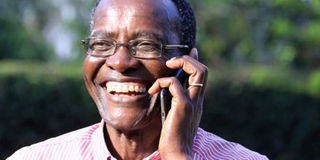Breaking News: At least 10 feared to have drowned in Makueni river
Judge's top qualities help him secure top job

Judicial Service Commission's Chief Justice nominee Justice David Maraga at his home in Karen on September 22, 2016. PHOTO | JEFF ANGOTE | NATION MEDIA GROUP
What you need to know:
- After leaving Law School, he joined private practice in Nakuru town until 2003 when he joined the High Court as judge.
- During his vetting by the Judges and Magistrates Vetting Board, Justice Maraga maintained that he had never taken a bribe in his life.
Justice David Maraga, a devout Seventh Day Adventist who said he would rather resign than work on Saturday, has been nominated as Kenya’s next chief justice.
Justice Maraga surprised members of the Judicial Service Commission (JSC) during his vetting for the position of CJ when he said that his actions were motivated by his religion and standing in the church where he serves as an elder.
During the vetting, the judge portrayed himself as untainted, a man of integrity and an insider who understands the workings of the Judiciary, a quality his predecessor Dr Willy Mutunga had been accused of lacking.
He was one of the three Court of Appeal judges who applied for the position.
A darling of lawyers, he is highly regarded for his punctuality, assertiveness and commitment to duty.
“He is a very strict man in his work and prefers to do his job with as little controversy as possible,” says lawyer Assa Nyakundi.
Before his appointment as Judge of the High Court, Justice Maraga was in private practice in Nakuru for 25 years, initially as a partner in the same law firm with lawyer Pravin Bowry.
“Unlike Mr Bowry, Justice Maraga did not have a distinguished career while in private practice. There is little which we can remember that he achieved,” says lawyer Steve Mogaka.
Justice Maraga received his Law Degree from the University of Nairobi in 1977 and he is currently pursuing a Master’s degree at the same university.
After leaving Law School, he joined private practice in Nakuru town until 2003 when he joined the High Court as judge, being a beneficiary of the Narc dream that recruited new names to breathe freshness into the much discredited Judiciary.
His first posting was in Mombasa where he worked for four and a half years.
At the beginning of 2008, he was transferred to Nakuru before moving to Nairobi three years later.
At the High Court in Nairobi, he served in the Constitutional Review Division before heading the Family Division. In 2011, he was promoted to the Court of Appeal.
TRIBALISM CLAIMS
Justice Maraga has served in many capacities in the Judiciary, including the Judicial Committee on Elections, the tribunal investigating corruption allegations against suspended judge Joseph Mutava and at the Law Society Continuous Legal Education Seminars.
Justice Maraga was also in the five-judge appellate bench which upheld the electoral commission’s position that the last General Election be held on March 4, 2013.
In 2012, he spoke on behalf of the Court of Appeal bench that overturned a landmark ruling holding that Kenya has jurisdiction to try piracy suspects even if the crimes were committed outside the country’s territorial waters.
As High Court judge stationed in Nakuru, Justice Maraga presided over the trial of four persons charged with torching the Kiambaa Church on January 1, 2008 during the post election violence.
Seventeen people were burned alive, while another 11 died on their way to hospital.
In his ruling, Justice Maraga acquitted all the four suspects and expressed his “outrage” at the behaviour of the police whom he accused of carrying out shoddy investigations.
During his vetting by the Judges and Magistrates Vetting Board, Justice Maraga maintained that he had never taken a bribe in his life.
He was further accused of being swayed by tribalism in a case in which a police officer, Andrew Omwenga, was accused of murdering Ainamoi MP David Kimutai and a policewoman by reducing a murder charge to manslaughter in favour of his tribesman.
In his defence, Justice Maraga maintained that, as a human being, he was also bound to err once in a while.





